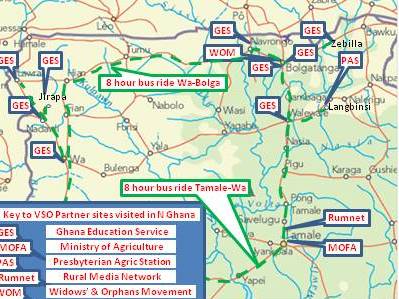I meet Maggi on the road, who cycles this way to an orphanage where she works – an hour’s commute morning and evening. It’s not a massive distance to Langbinsi, but the choices are to cycle on sand or, if you pick a firmer surface, on ruts running at right angles to the direction of travel. Anyway this is company for the first hour. When she's not in Africa Maggi works in the Justice Ministry in Germany, at the German Criminal Records Bureau. We ask some local schoolchildren to take photos near the orphanage.
 The road is really quite a challenge – I get a lift from a lorry but he’s only going a mile to the next village so it’s back on the bike again.
The road is really quite a challenge – I get a lift from a lorry but he’s only going a mile to the next village so it’s back on the bike again.
Here you can the road part-collapsed by a broken culvert.
This would all be much tougher in the rainy season.
Well, I could have done this faster on a tro-tro, but it’s good exercise and I’ve worked long enough on previous evenings so I think this is fair.
Sam and his colleagues Ignatius, Thomas, Belinda and Steven greet me warmly and explain how the Station runs. (Sam came to lunch in Walewale on Sunday but I missed him as I was travelling North on the coach from Accra. I've come to the conclusion that you haven't really met a volunteer unless you meet them in their home town - work, home or both). The station is essentially a source of agricultural advice – the staff at the station may not know the answer themselves, but they will know someone who does. They encourage better animal husbandry and crop care – and also encourage the keeping of cattle, which can be looked down on as being something that the Fellani people do rather than native tribes.
Sam cooks a splendid lunch for us (a colleague joins us) . His house is on the agricultural station - basically mud-hut construction but with electricity and running water. We have a good session afterwards talking through options and tactics on the Organisation Assessment.
 It’s getting on for 5pm before I go, and this time I take the easy way and put the bike on the roof of the tro. (It probably cost me more to cycle than to tro-tro, because a couple of days later the bike pedal breaks, costing me 5 cedis - £2 - for new pedals).
It’s getting on for 5pm before I go, and this time I take the easy way and put the bike on the roof of the tro. (It probably cost me more to cycle than to tro-tro, because a couple of days later the bike pedal breaks, costing me 5 cedis - £2 - for new pedals).
Sam comes with me to see me off on the tro, and engage in local conversation about the likelihood of a tro coming - one turns up and the bike goes on the roof. There is a very noisy argument lasting some 10 or 15 minutes and involving a dozen people or so which seems to be about who is on the tro and who is not, but my place doesn't seem controversial so I keep my head down and eventually after various adjustments of passengers we move off.
I get back to Walewale just in time to see Charlotte, Janet and Maggi emerge from the Moonlite Spot (i.e. bar) after having caught the last few minutes of the Ghana football team’s African Nations Cup semi-final victory.

















